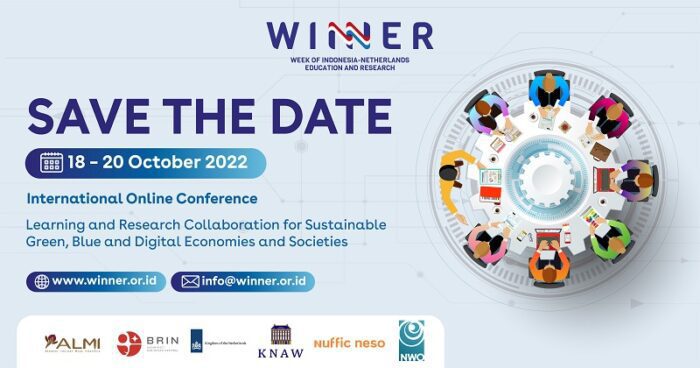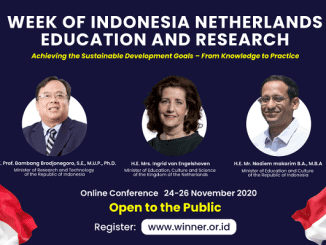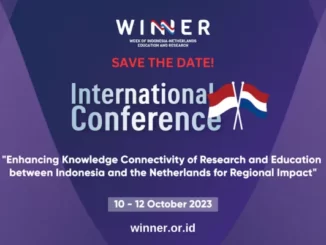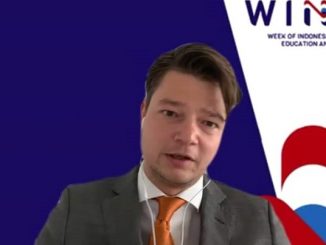
JAKARTA, KalderaNews.com – How can the WINNER conference support the issue of academic freedom in Indonesia? Panellist Herlambang Wiratraman hopes to get Dutch support for promoting and strengthening academic freedom in Indonesia. For instance: ‘Data protection doesn’t protect citizens or researchers. I hope that Dutch academics will speak out, share their experiences, and even the Dutch government need to reconsider their research cooperations that don’t live up to fundamental freedoms.’
When he witnessed Leiden law students challenge the dean and debate the faculty on sensitive topics like the extreme right politician Geert Wilders, Herlambang Wiratraman (Indonesian Caucus for Academic Freedom and assistant professor at the Faculty of Law, Universitas Gadjah Mada) was excited. ‘That’s why Leiden University is really ‘Praesidium Libertatis’, a ‘stronghold of freedom’. This would never happen in Indonesia, students challenging a dean. At least not without retaliation.’
Not many dare to speak out
‘Of course academic freedom is not absolute’, explains the legal scholar Wiratraman. ‘But rights must always be limited on the basis of legal arguments. Proportionality for instance. You cannot curb academic freedom because you don’t like the research results.’ The practice Wiratraman witnesses in Indonesia differs a lot from that theory. ‘When an academic has an opinion on the current government, he or she is targeted by government officials and even law enforcement. You can be interrogated, fined, or even put in jail for venting a dissenting opinion.’
RELATED TOPICS:
- Gratis dan Terbuka untuk Umum! Konferensi Internasional Indonesia-Belanda WINNER 2022 Dihelat 18-20 Oktober 2022
- Diskusi WINNER 2021: Lembaga Pendidikan Harus Ikut Aktif Berpartisipasi dalam Pencapaian SGDs
- WINNER 2020 Jadi Tonggak Baru Kolaborasi Pendidikan dan Penelitian Indonesia-Belanda
Unfortunately, not many Indonesian researchers dare to speak out. Nevertheless some hundred academics join the Indonesian Caucus For Academic Freedom (KIKA), of which Herlambang Wiratraman is on the Advisory Board. The Indonesian Caucus for Academic Freedom (KIKA) is a national coalition of researchers and students who are concerned about human rights and fundamental freedoms, especially those related to academic freedom. KIKA started in 2017 and has four autonomous branches at local levels, in Aceh, Papua, Bali, and East Kalimantan.
With his organisation Wiratraman works on bolstering the legal framework for academic freedom. ‘In 2017 we drafted the Surabaya Principles for Academic Freedom. Step by step we work on embedding these principles in national and international law.’ For Wiratraman academic freedom has two aspects. Firstly the right to individual freedom – ‘Compare it to the freedom of expression’ – and secondly the freedom of educational institutions that secures their autonomy. But the resistance is strong: in 2019 the government passed a science law that requires alle research considered ‘dangerous’ require a permit of the central government.

Asked whether Wiratraman himself has encountered threats related to his work on academic freedom, he smiles meaningfully. ‘Let’s say I put myself at risk.’
Independent research is at stake
Academic freedom has everything to do with environmental issues, Wiratraman explains. ‘We face excessive exploitation of natural resources in Indonesia. This is not just about the environment itself, but about the destruction of human kind.’ Recently Science reported on the case of Dutch environmental scholar challenging the Indonesian government’s notion that “the orangutan populations in the country are thriving”. The government’s response: banning the researcher from the country. Wiratraman: ‘What is at stake is the independence of Indonesian science in general and conservation science more specifically.’
He continues: ‘It happens even more outside of Java. The case of Erik Meijaard is instructive. He did over 15 years of research on rhino’s and orangutans and the problem of deforestation and land burning. But his conclusions were inconvenient.’ According to Wiratraman the Indonesian government should at least have exchanged views with the critical scholar. In stead Meijaard was expelled from the country. ‘For me this is not surprising’, Wiratraman adds. ‘Under this regime the attitude and the narrative has become “anti-science”.’
Another issue Wiratraman like to draw attention to is academic appointments. ‘In Indonesia the rector of the university is appointed by the Minister for 35% vote. This makes difficult to criticise the government. If we want to tackle big problems like climate change, the government must adhere to academic freedom. Otherwise valuable knowledge will be lost.
Data protection
What does Wiratraman like to gain from the WINNER conference in which he takes part? ‘With regard to the topic of digital transformation, I would like to stress that currently we have little data protection in Indonesia. Even there is limited awareness for protecting data. Under the Electronic Information and Transaction Law, there is a cyber defamation article which could target academics to silence criticism.
The most recent government bill on data protection protects mainly officials and corporations, while on the other hand it limits to protect citizens or researchers rights. In order to promote scientist’s freedom, we need a solidarity from the Dutch side to strengthen the data protection as well as digital rights for researchers.’
Another thing Wiratraman expects from the Netherlands is stricter criteria for funding. ‘For example: at the North Sumatra University (Universitas Sumatera Utara) a students’ journalist group was dissolved because of a poem one student wrote about LGBT. And it didn’t stop at that: they even destroyed and set fire to the students’ office. ) If this university would cooperate with let’s say with Dutch Universities, what consequences would this have for the cooperation?
Furthermore Wiratraman thinks that the Dutch government stops funding research cooperations that thwart fundamental freedoms. The Netherlands should increase its scrutiny, looking at criteria for academic freedom’, since the Dutch government has invested a lot of money in research cooperation.
Who is Herlambang Wiratraman
Herlambang Wiratraman, Assistant Professor at Universitas Gadjah Mada (UGM), is a vice coordinator of ALMI’s science and society. Specialist in constitutional law, human rights and freedom of expression. Currently, Chair of Research Center for Law and Social Justice, Faculty of Law UGM, and also an Advisory Board member of KIKA, Indonesian Caucus for Academic Freedom. Herlambang is the recipient of 2018’s Yamin Award on Constitutional Law Studies and 2022’s Tasrif Award for Freedom of Expression and the Press.
If you want to join this event, please register .
* Jika merasa artikel ini bermanfaat, silakan dishare pada saudara, sahabat, dan teman-temanmu





Leave a Reply